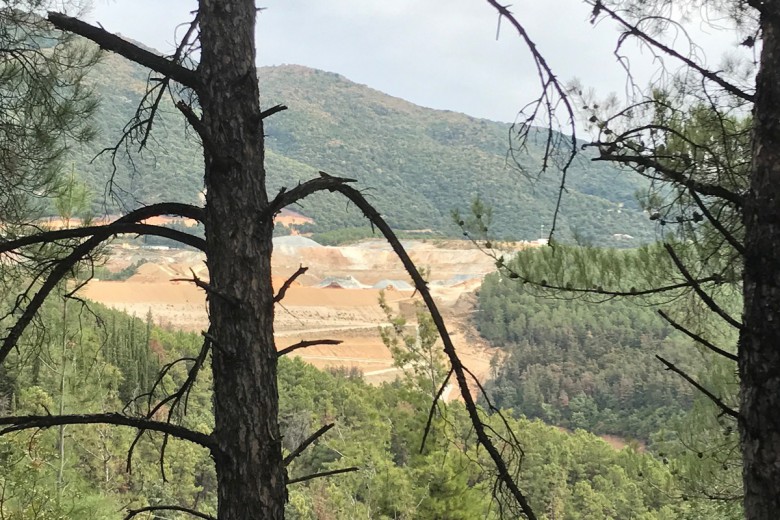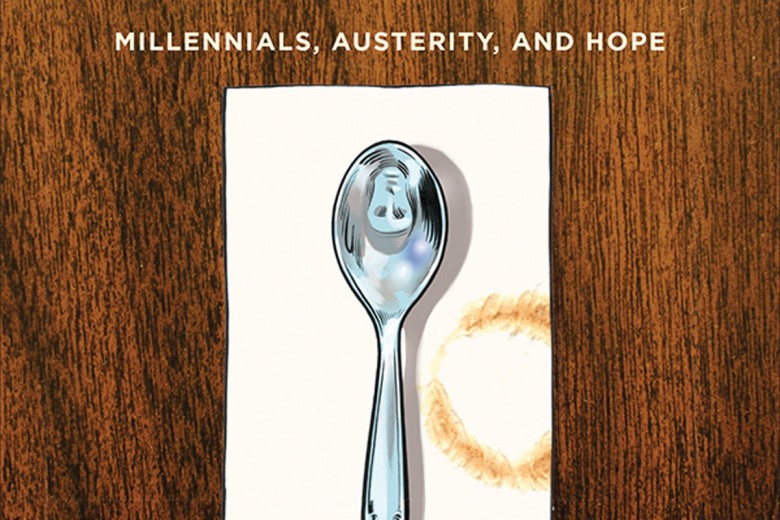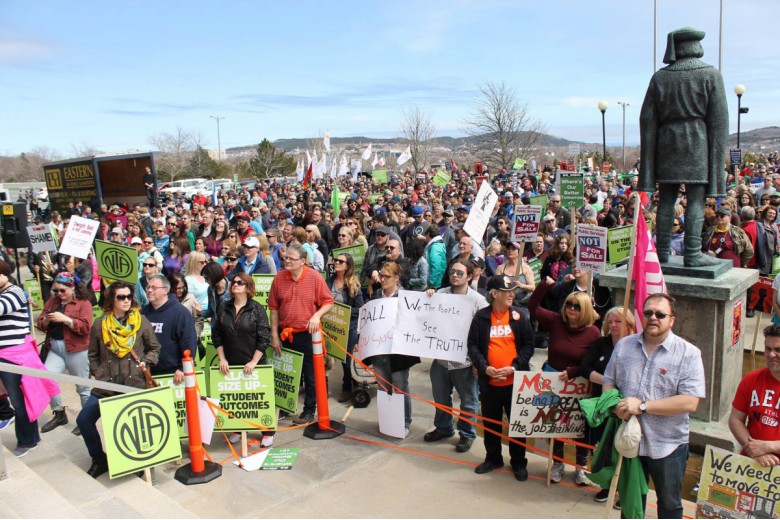The Halkidiki peninsula in northern Greece is shaped like a hand, with three fingers pointing into the Aegean Sea, the spaces between the outstretched fingers filled with clear blue water and beaches lined with hotels and restaurants. A palm reader looking at this hand would see a spot just above the third finger. Depending on the palm reader’s politics, that spot could be a harbinger of prosperity – or danger.
The Greeks call it Skouries, meaning “rust,” because people have been mining copper, gold, silver, and other base metals from this ancient forest since around the time Aristotle was born less than 40 kilometres away. Today, it’s the site of an open-pit gold and copper mine owned by Vancouver-based Eldorado Gold.
A few years ago, that activity set off what the Globe and Mail described in 2012 as “something akin to civil war.” Protesters swarmed the forest, throwing flares, rocks, and gasoline bombs at police, who responded with tear gas and by arresting as many people as possible, often violently.
Today, the forest is relatively calm. Many activists are out of the game, facing expensive court cases with the government, or have given up, leaving just a few dozen protesters to stare down police at intermittent protests.
“The grey car is state police,” says Elli Damaskou, an anti-mining activist. “We know the cars, we know the faces,” she says while sitting under a tree in the centre of Megali Panagia, the town closest to the mine, where she has lived most of her life.
“The police are present day and night, taking care of a private company,” she says in a matter-of-fact way that reflects the number of times she has explained her concerns to outsiders.
But on this particular day in March, she suspects they’re here because of the drill.
A few days earlier, a group of activists, mostly locals and including Damaskou, prevented a truck carrying an enormous drill rig from entering the forest. They knew Eldorado Gold would eventually search for new deposits of precious metals, but they were not expecting it to be in a new part of the forest so soon – “at least not for another 15 years,” says Damaskou.
Furious, the protesters sent the truck and the drill back down the mountain. It returned when the protesters had gone home and no one was watching.
Furious, the protesters sent the truck and the drill back down the mountain. It returned when the protesters had gone home and no one was watching.
Such a move would have drawn upwards of one thousand protesters into the forest only a few years ago. Now, only a few dozen of the most committed anti-mining activists show up on a sunny Sunday afternoon to examine the drill. The protesters stage a tense but uneventful standoff with police, and then drive home, dispirited.
“The people are tired, bored, and afraid,” says Damaskou. “The leftist government promised they would close down the mine and the movement became quiet.”
Damaskou and others who continue to protest the mine argue that Syriza, the radical leftist party that took over the government in 2015, killed their movement.
“People [in Halkidiki] invested a lot in the Syriza government,” says Giorgos Velegrakis, a PhD researcher at Harokopio University in Athens who studies the resistance to Eldorado Gold. He says people believed the mine would be shut down or at least minimized, “and they were totally disappointed.”
Velegrakis helped write the environmental section of Syriza’s manifesto and says shutting down the mine was part of Syriza’s official platform in the early days of the party, with party leaders, including now-Prime Minister Alexis Tsipras, promising to shutter the mine. Local members of parliament were openly against the project, too, Velegrakis says.
In its early days in power, the Syriza government threw up obstacles for the company and suspended activities at the mine. Then, in an abrupt about-face last May, the government gave Eldorado Gold the green light to continue construction of the Skouries gold mine.
Now, according to Velegrakis, instead of talking about shutting down the mine, the government talks about making the company follow the rules.
People are still angry at the government, but their anger isn’t as explosive as it was four or five years ago, says Panagiotis Sotiris, a Marxist philosopher and political activist in Greece. “When you see a left-wing government implementing the same measures [as a right-wing government], it creates disillusionment in people.”
That has left the Greek people disoriented, says Sotiris. “It creates a sense that there is no hope, everyone is corrupt … and this is the most fertile ground for the right.”
Sotiris says that the government’s reversal has created a “rather difficult situation” for the Greek radical left. “Those of us that still believe in the possibility of change have to reconstruct hope.”
The Skouries gold mine is the largest of four mining projects that make up the Kassandra mines, which Eldorado Gold acquired in late 2011 for about $2.5 billion in shares. It will become operational in 2019, starting with nine years of both open-pit and underground mining followed by another 15 years of underground mining.
Eldorado Gold proclaims that its mining projects will generate upwards of US$1 billion in taxes and royalties for the Greek state over the lifespan of its mines, depending on the price of metals. The Skouries mine alone is expected to account for about two-thirds of that sum over its 24-year use period.
Anti-mining activists are concerned that the mine will pollute and deplete a precious aquifer deep inside the mountain that provides fresh water to the villages and is already threatened by climate change. Residents also worry that deforestation will erode the land, and that dust from the mine will contaminate local farms.
Those who support the mine, including miners, say it has created precious jobs in a remote region of the country during a time when one-third of Greeks face poverty, unemployment lingers around 23 per cent, and pensions have been cut 12 times in seven years.
Pro-mining advocates argue that Greece is the perfect place for a new mine, given its current vulnerabilities in the global economy as it struggles to recover from the Greek debt crisis triggered by the Wall Street collapse of 2008 and the subsequent global recession. The International Monetary Fund, European Central Bank, and European Commission, popularly referred to as the “troika,” granted Greece two international bailouts totalling €240 billion – on the condition that Greece implement an austerity agenda and attract foreign investment.
In 2015, Greece was at a crossroads, says Sotiris. It could either acquiesce to the development proposed by foreign companies like Eldorado Gold and pay the environmental and social costs, or it could remove itself from the European Union (EU) and its financial safety net to pursue economic independence, he says.
In a 2015 referendum asking whether the Greek government should accept the bailout conditions set out by its creditors, the public voted overwhelmingly against the austerity measures of the troika. Despite that result, and the fact that Tsipras himself had encouraged the Greek people to vote against austerity, Tsipras capitulated in his negotiations and accepted the conditions.
Over time, the Syriza government dropped the radical aspects of its program, says Velegrakis. “You could feel the party becoming less radical as it became more powerful.”
It soon reversed its stance on the gold mine as well, replacing two energy ministers who periodically threw up roadblocks for the mine with a minister who would ultimately make things easier for Eldorado Gold’s operations.
Tsipras traded out other hard-left players in his cabinet for more moderate ministers in November 2016 with the intention of “improving relations with international creditors,” as the Financial Times reported. The new energy minister, Giorgos Stathakis, approved the construction of a key processing plant within two weeks of taking office, effectively unblocking construction of the gold mine. The move quelled corporate anxiety.
Over time, the Syriza government dropped the radical aspects of its program, says Velegrakis. “You could feel the party becoming less radical as it became more powerful.”
Now, according to Maria Kadoglou, the coordinator of Hellenic Mining Watch in Halkidiki, the government is trying to convince the Greek people of the value of unearthing the billions of dollars’ worth of gold.
However, critics wonder how much of that corporate money will make its way into Greek coffers. “There is a kind of race to the bottom in an effort to attract investment,” says Dennis Howlett, the executive director of Canadians for Tax Fairness, a civil society group that monitors corporate tax payments in Canada and abroad. “Countries end up giving [away] any potential benefit they might gain from that investment, and the Greek case is a good example of that,” he says.
Some of Eldorado Gold’s tax breaks are visible in its report filed under the Canadian government’s Extractive Sector Transparency Measures Act (ESTMA), which came into force in 2015 and requires oil, gas, and mining companies listed on Canadian stock exchanges to disclose payments over $100,000 to governments.
The report shows the company offset US$3,490,000 of its tax, royalties, and infrastructure improvement payments through standard value-added tax credits that the government owed the company. After all was said and done, the company owed less than half a million dollars in taxes and royalties for all of its mines in Greece, including Skouries.
Even if the mine produces more royalties and taxes for the Greek state in the future, it won’t make up for the burdens that the community is already facing, says Kadoglou.
There are 16 villages surrounding the mine, and they make up the municipality of Aristotle, which is home to about 20,000 people. Residents of the municipality are still paying for the government crackdown on protests in 2015. Kadoglou explains that many face court cases, some of which include serious felony charges based on laws that are meant to target organized criminal organizations. That, says Kadoglou, has placed a significant financial burden on local communities. Residents are facing “trials, trials, and more trials,” she says.
At the end of May, 77-year-old Thodoros Karavasilikos was sentenced to one year in prison for resisting arrest during an anti-mining protest four years ago, where he claims he was beaten by police and spent seven days in the hospital. His sentence includes three years of parole, implying that he can go to jail if he gets arrested again, says Kadoglou. This deliberate strategy is aimed at reducing participation in protests.
The government is sending a message. “Don’t move, don’t breathe, don’t do anything,” says Kadoglou.
While the government takes citizens to court, people are also suing each other over violence, says Damaskou. Megali Panagia, the town where Damaskou grew up, is traditionally left-leaning, but the proximity to the mine makes it a convenient place for miners to live. That has created rifts in Megali Panagia, resulting in fights between anti-mining and pro-mining residents.
“We’re all in the same bars,” says Damaskou. The social costs are “too heavy for a village to lift on its own,” she says.
In other villages, some families have stopped talking to each other over disagreements related to the mine.
Sofia Katsirma, an anti-mining activist who lives in the tourist town of Ouranoupolis, no longer speaks to her uncle and his family who live in Palaiochori, a nearby pro-mining village. She says her uncle, who rents rooms in his hotel to miners, called her father’s house to berate Katsirma’s family for opposing the mine. Since then, she says, he has been seen sharing the names of her family and other anti-mining activists around his village.
Greek society is deeply divided, says Sotiris. “There is no common narrative. This is what is missing in Greek society.”
The inability to stick to a radical leftist program in the face of extreme pressure from the EU is the true cause of Greece’s problems.
Instead of simply blaming Syriza for selling out the Greek people, Sotiris prefers to focus on the strategic and ideological limits of the Greek left. The inability to stick to a radical leftist program in the face of extreme pressure from the EU is the true cause of Greece’s problems, he argues. “If we are going to recompose a left that will not be defeated, it requires a painful process of rethinking, reflection and … [self-]criticism.”
Damaskou’s advice for other communities fighting mining companies is simple: Don’t let the company do anything. “Nothing, not even a tree should be cut,” she says.
“We let them get inside the forest, and that was our mistake,” she says. “We’ve been trying to win it back since 2012.” It’s a hard lesson to learn, but it reminds the left to shed the illusion that elected governments, even those that purport to be radical, will defend front-line resistance.






_780_520_90_s_c1.jpg)
